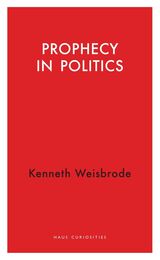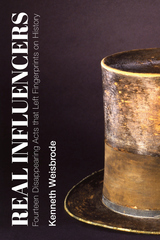2 books about Weisbrode, Kenneth

Prophecy in Politics
Kenneth Weisbrode
Haus Publishing, 2026
A selection of case studies on prophecy, belief, and political strategic thought.
Ralph Wigram was a minor British bureaucrat who is known to a small part of posterity only because Winston Churchill paid tribute to him as the man who warned of the Nazi threat with such persistence, conviction, and hard evidence that Churchill had the wherewithal to make the case to the British people. Wigram died at the end of 1936, just before the war he warned against had begun. He might have changed the course of history—if only people had believed him.
Prophets like Wigram are a permanent fixture of a world without certainty. Oracles, shamans, wiseacres, astrologers, and swamis of all shades populate our myths, legends, and Bibles. Today, our lives are inundated with the wisdom of professional forecasters, intelligence analysts, and threat mongers. Why do many of us, and especially our leaders, find it so difficult to heed warnings? We tend to underreact to some, overreact to others, and then point fingers when what “nobody ever anticipated” comes to pass. Why is prophecy so dogged?
Prophecy in Politics takes up a vast, complex, and well-worn subject—the future—and reduces it to its most essential aspects, especially belief. It revisits a half-dozen familiar and not-so-familiar incidents of prophecy, from the warnings given to Stalin about Operation Barbarossa to those given to Bill Clinton and George W. Bush about “terrorism,” to the Cassandras periodically promising collapse in the financial markets, to uncover a pattern of complacency and neglect. Finally, Ken Weisbrode proposes what all of us might do to overcome complacency and make prophecy work better for us. This is not a handbook or an attempt to stand in the vanguard of political or strategic thought on futurism, futures studies, or futurology; rather, it is a concise overview and an idiosyncratic but nevertheless useful guide to thinking about the past and present condition of prophecy.
Ralph Wigram was a minor British bureaucrat who is known to a small part of posterity only because Winston Churchill paid tribute to him as the man who warned of the Nazi threat with such persistence, conviction, and hard evidence that Churchill had the wherewithal to make the case to the British people. Wigram died at the end of 1936, just before the war he warned against had begun. He might have changed the course of history—if only people had believed him.
Prophets like Wigram are a permanent fixture of a world without certainty. Oracles, shamans, wiseacres, astrologers, and swamis of all shades populate our myths, legends, and Bibles. Today, our lives are inundated with the wisdom of professional forecasters, intelligence analysts, and threat mongers. Why do many of us, and especially our leaders, find it so difficult to heed warnings? We tend to underreact to some, overreact to others, and then point fingers when what “nobody ever anticipated” comes to pass. Why is prophecy so dogged?
Prophecy in Politics takes up a vast, complex, and well-worn subject—the future—and reduces it to its most essential aspects, especially belief. It revisits a half-dozen familiar and not-so-familiar incidents of prophecy, from the warnings given to Stalin about Operation Barbarossa to those given to Bill Clinton and George W. Bush about “terrorism,” to the Cassandras periodically promising collapse in the financial markets, to uncover a pattern of complacency and neglect. Finally, Ken Weisbrode proposes what all of us might do to overcome complacency and make prophecy work better for us. This is not a handbook or an attempt to stand in the vanguard of political or strategic thought on futurism, futures studies, or futurology; rather, it is a concise overview and an idiosyncratic but nevertheless useful guide to thinking about the past and present condition of prophecy.
[more]

Real Influencers
Fourteen Disappearing Acts that Left Fingerprints on History
Kenneth Weisbrode
St. Augustine's Press, 2022
What is influence and why might real influencers be those whose names we no longer remember? Ken Weisbrode embarks on an exploration to trace the most powerful strands of cultural and intellectual influence, and demonstrates it might not be what we think it is.
"The influencer is a person who made an art of absence in the trade of cultural and sometimes political capital. The ones in this book represent a range of vocations, from politics to diplomacy to novel-writing, but almost all were cultural entrepreneurs. They were not puppet masters, gray eminences, unsung heroes, or Svengalis––although one or two have been portrayed thus. Rather, their influence is spread by virtue of their willful disappearance, of its perpetuation of a new language and cultural standard, and of their many conscious and unconscious imitators. The reason they had such influence was precisely because a part of their method was to be less visible in order to watch their ideas, habits, and styles proliferate without their names necessarily being affixed. […] Yet, to understand such a modus operandi is necessary today when the proliferation of social media influencers are squandering cultural capital so quickly by the simultaneous promotion of their products, above all, themselves."
"The influencer is a person who made an art of absence in the trade of cultural and sometimes political capital. The ones in this book represent a range of vocations, from politics to diplomacy to novel-writing, but almost all were cultural entrepreneurs. They were not puppet masters, gray eminences, unsung heroes, or Svengalis––although one or two have been portrayed thus. Rather, their influence is spread by virtue of their willful disappearance, of its perpetuation of a new language and cultural standard, and of their many conscious and unconscious imitators. The reason they had such influence was precisely because a part of their method was to be less visible in order to watch their ideas, habits, and styles proliferate without their names necessarily being affixed. […] Yet, to understand such a modus operandi is necessary today when the proliferation of social media influencers are squandering cultural capital so quickly by the simultaneous promotion of their products, above all, themselves."
[more]
READERS
Browse our collection.
PUBLISHERS
See BiblioVault's publisher services.
STUDENT SERVICES
Files for college accessibility offices.
UChicago Accessibility Resources
home | accessibility | search | about | contact us
BiblioVault ® 2001 - 2025
The University of Chicago Press









